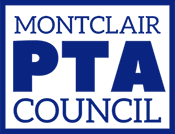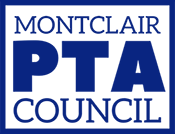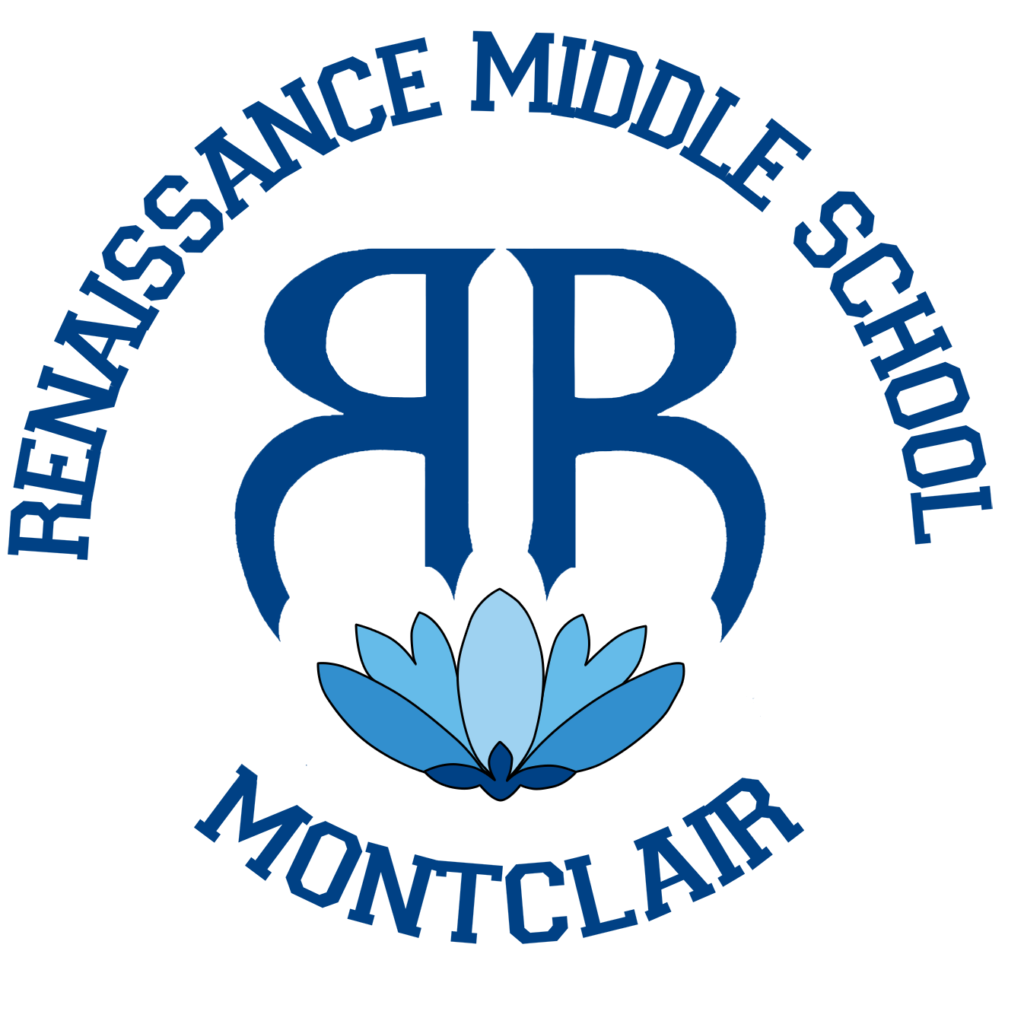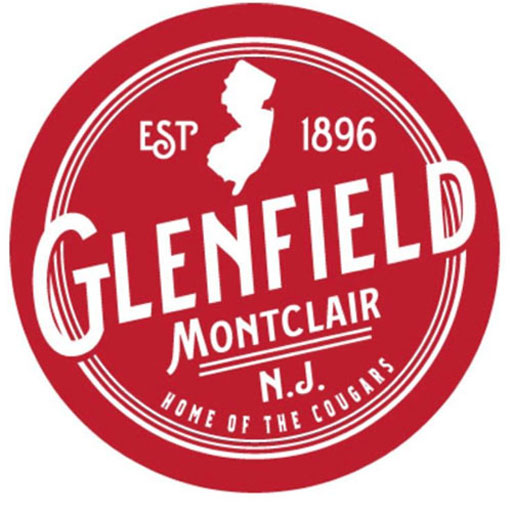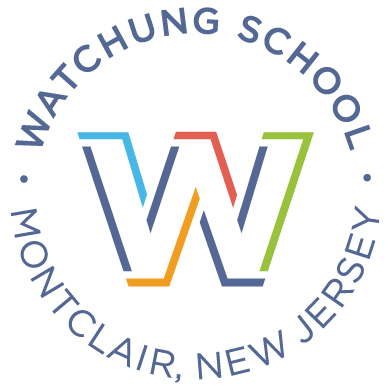Watch the Video “A Dire Need”
Rebuild Montclair Schools
Montclair Public Schools Community Investment Bond Referendum Vote
Tuesday, November 8, 2022
Polls Open 6 AM – 8 PM
Early Voting Starts October 29, 2022
Montclair school buildings need urgent building repairs estimated at $187.7M

PROPOSED SOLUTION
-
State of New Jersey provides debt service for $58M
-
Montclair Township will be responsible for debt service for the balance of $129.7M after issuing 20-year municipal bonds in three installments in the years 2023, 2025, and 2027
TAX IMPACT
-
Township pays for the bonds by progressively raising property taxes – $258 in the first year for the average Montclair property assessed at $628,952
-
Over the 24-year period of bond repayment, the average annual impact will be $732 for that same property
WHY NOW?
-
The longer we put these needed repairs off, the more they will cost, with potentially increased risks to health, safety, and liability
-
Years of underinvestment in maintenance and repairs cannot be remedied within the normal Montclair Public School District budget process
-
The $58M offer from the State of New Jersey (31% of $187.7M) may not be available in the future
Vote Yes to #RebuildMontclairSchools
November 8, 2022 Referendum
The urgent need for repairs can only get worse, and cost more. To avoid an even higher and unpredictable tax increase, and for schools to meet basic 21st century educational and building code standards, #RebuildMontclairSchools by voting Yes to “Approve the Bond Proposal” on November 8.
WHAT is being funded
What kind of repairs are included in the $187.7M?
More than a year ago, the Board of Education hired architecture and construction professionals to evaluate what it would take to update our schools and meet basic standards that directly affect the quality of our education system.
Results: 14 of 15 school buildings are in need of major repairs.
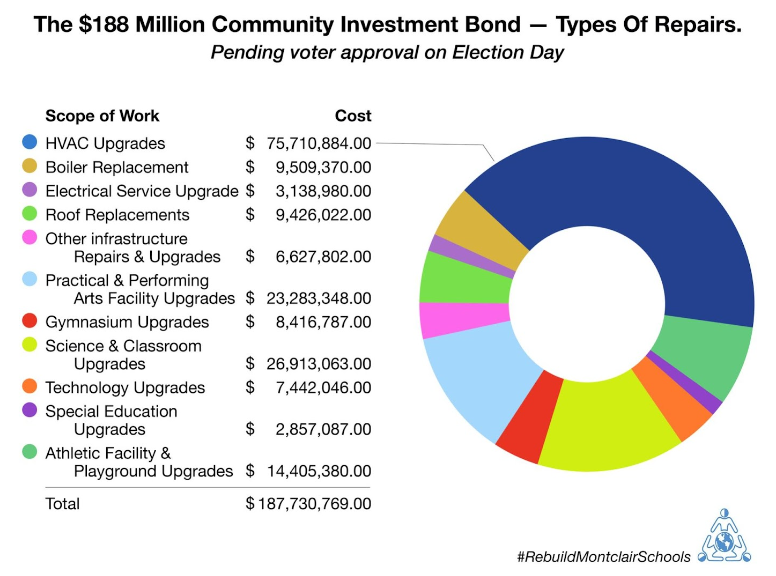
Most of our schools are old. They were built in the late 19th to mid 20th century and we have historically underinvested to maintain them adequately. In 2022, they don’t have air conditioning, boilers are often too old to be fixed and don’t have standard replacement parts, electrical systems are not up to code, air quality control is poor and not compatible with add-on solutions, walls are cracking and whole rooms or sections of corridors are deemed unsafe for our children and their teachers.
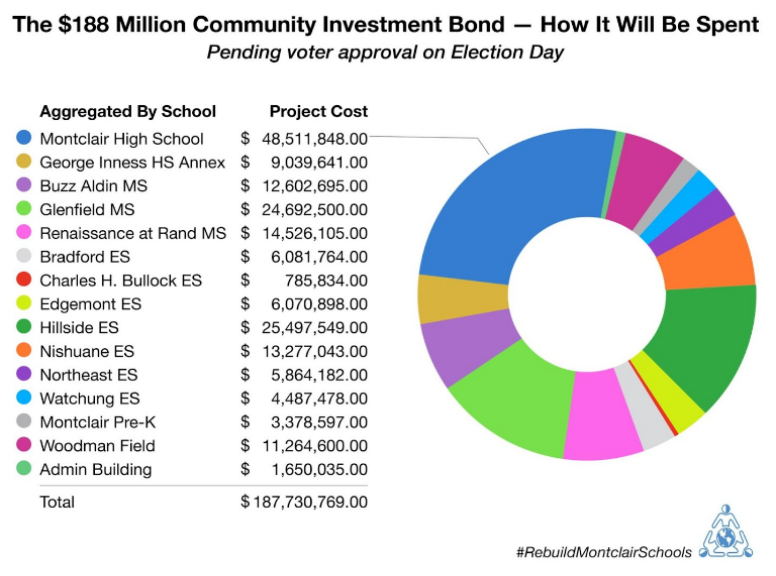
What Impact will the repairs have on the quality of education?
Repairs will increase the quality of our education and considerably reduce the health and safety risks that the current infrastructure engenders.
Further, studies show that hot classrooms lead to the worst academic outcomes and widen the racial achievement gap. Our science and art classrooms are simply outdated and under-equipped. Gyms and sports facilities do not meet today’s standards and certainly do not compete with the infrastructure of surrounding towns. Repairs will bring the education infrastructure to support the education and instruction needs of the 21st century.
How can I visualize the projects being planned?
Click here to download a PDF of before and after project examples from each school.
WHY it’s important
Wait, why is the district not paying with its already big school budget (56% of our taxes)?
56% of the total town budget for schools is at the lower end of the range for comparable towns in our region.
The annual budgeting process does not adequately address end of life asset replacements. The school district’s annual operating budget has line items to cover basic maintenance and “break-fix” for the district’s facilities. This is inadequate when structures and systems are so old as to be beyond any warranties or beyond their “useful life” (e.g., roofs, boilers, unit ventilators).
Also, almost 80% of the annual operating budget is made up of Personnel costs. That leaves little discretionary budget for infrastructure. Finally, there are regulatory limits on how much a district can increase its operating budget revenue in any given year, which render it almost impossible to even maintain existing staff and programming. School districts cover any major renovations and upgrades or system replacements through the issuance of capital bonds, and this is the standard practice statewide. Some of the pressures driving increase in operating budgets are related to the stop-gap maintenance, higher frequency inspections, and temporary fixes. These will get mitigated or eliminated with the updated infrastructure.
Under the current elected Board of Education structure, this is not possible.
Until 2021, Montclair Public Schools was a “Type 1” school district with an appointed Board of Education and a Board of School Estimates composed of the Mayor and two other representatives from the Township Council, plus two representatives from the appointed Board of Education. As a Type 1 district, the district’s operating budget and capital budget requests were all subject to review and approval by the Board of School Estimates.
And if capital budget requests were approved, the Township was charged with issuing bonds and carrying debt on the district’s behalf, much as they are for other Township capital expenses for municipal government (e.g., Montclair Police Department, Montclair Fire Department). But just as on the district side, Township operating budgets are typically designed to cover basic maintenance and “break-fix”, with bonds generally issued to cover any major renovations, upgrades or system replacements. In November 2021, Montclair voters overwhelmingly supported conversion of the Montclair Public Schools to a “Type 2” district (like the vast majority of districts in New Jersey), where Board members are elected by the public and major capital expenses are presented to the voters in a public bond referendum.
Again, until November 2021, the issuance of bonds to support the material capital needs of the schools was subject to the review and approval of the Board of School Estimates, which was under the majority control of the Mayor and Township Council. Since the completion of the new Charles H. Bullock school in 2010 (and to a large degree prior to this large new construction project) the Township Council and Board of School Estimates have been reluctant to issue material amounts of new debt on behalf of the school district to fund material renovations, upgrades or system replacements. In 2012, Mayor Robert Jackson and his Montclair 2012 slate swept the municipal elections with a platform promising debt reduction and improving the Township’s debt rating.
The Montclair 2012 team kept their campaign promises through two terms and into a third term under Mayor Sean Spiller, restoring an AAA credit rating for the Township, but in the process the Board of School Estimates kept a tight cap on approval of debt issuance for the schools. The Board of Education was urged to request no more money in new capital bonding than could be canceled from previously issued open bonds, resulting in capital funding of approximately $2-3 million per year, even when, as in 2016 and 2021, the Board of Education formally requested that the Board of School Estimates approve a much higher level of investment based on its assessment of the district’s capital needs.
It has become abundantly clear that given the number, size and age of the district’s facilities, a much greater level of investment is required, to prevent small problems from becoming crisis-level ones, as the district has seen with stairwell collapses and ancient, overtaxed HVAC systems that were no match for the COVID pandemic and that contributed to extended virtual instruction that hampered the academic, social and emotional needs of all children and exacerbated the district’s existing opportunity and achievement gaps, while also exacerbating health and safety risks to students and staff as schools re-opened for instruction.
Many Montclair voters cited the appointed Board of Education’s and the Board of School Estimates’ sustained failures to provide adequate facilities funding for the schools as a basis for their votes in November 2021 to convert Montclair Public Schools from a Type 1 to a Type 2 district. As a community, we now have the direct power and the responsibility to redress the school district’s extensive capital needs, and to provide students and staff with safe, healthy and educationally sound schools.
HOW we got here
How do I calculate the impact on my own tax bill?
Montclair property taxes will be raised incrementally over seven years to support the repayments of the bonds.
The increase starts at $258 in the first year for the average homeowner assessed at $628,952 and gradually increases over the next seven years. Overall, the average annual tax impact works out to $732 for the average home assessed at $628, 952.
In order to calculate the change in your property tax payments, please put in your home’s assessed value in the Tax Calculator below to get the estimated first year increase and estimated average increase over the lifetime of the bonds.
The actual taxes may differ from the estimates based on changes in interest rates, timing and size of bond issuances.
CLICK HERE to open Tax Calculator.
How certain are we that we can get a bond with the terms mentioned above?
The district has been working with finance experts who are in the market every day. The current terms being used for the assessment are based on the best inputs provided by these experts.
The alternative to not issuing the bonds is the continued larger increase in operating costs that may increase significantly further if we have to cover catastrophic failures. The economic conditions that may materially make the bond terms worse by the time of issuance are also the same conditions that would cause material increases in operating costs with stop-gap measures. So overall, the terms of the bond are likely to be what the current assumptions are and they certainly will remain the lower cost option compared to business-as-usual.
With higher interest rates, is this the right time to borrow so much money?
The bonds issued for the capital projects are long term bonds (20 year term). Although they are impacted by the current rate environment, they are much further out on the yield curve and the magnitude of impact is less than that for short term debt.
That said, it is unfortunate that the Board of Education and Board of School Estimates were unable to reach an agreement to approve bond issuance before the 2021 election so that the community could have taken advantage of the lowest interest rates in a lifetime. However, there is no expectation and certainly no promise that interest rates will be getting lower in the near future, and the facilities needs are only getting worse. If the facilities are allowed to further age and deteriorate, the price tag to remediate them will only rise with time, the annual maintenance and “break fix” costs in the operating budget for those outdated systems will continue to rise, and interest rates may continue to rise as well.
Also, more importantly, we know that if Montclair voters approve the Community Investment Plan in November, the State of New Jersey has committed to provide $58 million in debt service aid, which would cover the cost of approximately 31% of the district’s debt service costs over the 24-year life of the $188 million in debt service payments for the bonded projects. So Montclair taxpayers would essentially bear only 69 cents on the dollar for the $188 million in capital projects covered by this referendum, should it pass now.
However, should Montclair vote against this referendum on November 8, 2022, there is no assurance that any state debt service aid, let alone at the level currently committed, would be available to defray the burden on the Montclair taxpayers when the need to meet the dire facilities needs of the schools is finally embraced. No amount of interest rate impacts will be able to overcome the loss of this 31% discount.
How do I know that the town will not come back and raise my taxes again in the next 2-3 years?
Absent the Community Investment Plan, Montclair is at a much higher risk of unpredictable tax increases with little to no choice.
The Community Investment Plan was developed after a comprehensive review of infrastructure needs throughout the school system with multiple experts conducting the review with critical inputs from a variety of stakeholders, including Principals, Buildings and Grounds Supervisor, and Head Custodians in each school. There were thorough walk-throughs of every building. An updated infrastructure will come with warranties and significantly lower breakdown risks and the associated costs.
Also, the Superintendent and the Board of Education have publicly articulated that one of the reasons they decided to seek voter approval of a $188 million bond referendum was specifically because they didn’t want to have to seek voter approval of, say, just $70 million for HVAC repairs this November only to then have to come back to the voters again in one or two years to obtain their approval for another large bond referendum to cover other critical renovations, systems replacements and educational enhancements. Instead, to ease the burden on taxpayers and the debt service costs to the district, the Board of Education has announced that, upon approval by Montclair voters, the bond issuance will be phased in over three “tranches” and five years, so that taxpayers aren’t paying for debt principal and interest payments until the projects are ready to be bid, awarded and executed.
While there is no guarantee against future tax increases or bond proposals to support the operational or capital needs of the school district (or the Township), the critical facilities needs redressed through the projects included in this $188 million Capital Investment Plan will not go away, the operating costs for maintenance and “break fix” of outdated systems will continue to rise, the capital costs that would be needed to remedy the needs will continue to rise, and the Board of Education has clearly articulated their intent *not* to come back to the voters for another large capital bond referendum in two or three years.
ACTION?
Vote Yes to #RebuildMontclairSchools
To the Polls on Election Day, Tuesday, November 8
NEED A RIDE
GIVE A RIDE
LEARN HOW TO VOTE YES
Attend a Coffee Klatch
GET A LAWN SIGN
VOLUNTEER
SHARE THIS PAGE
©2022 Montclair PTA Council. All Rights Reserved.
